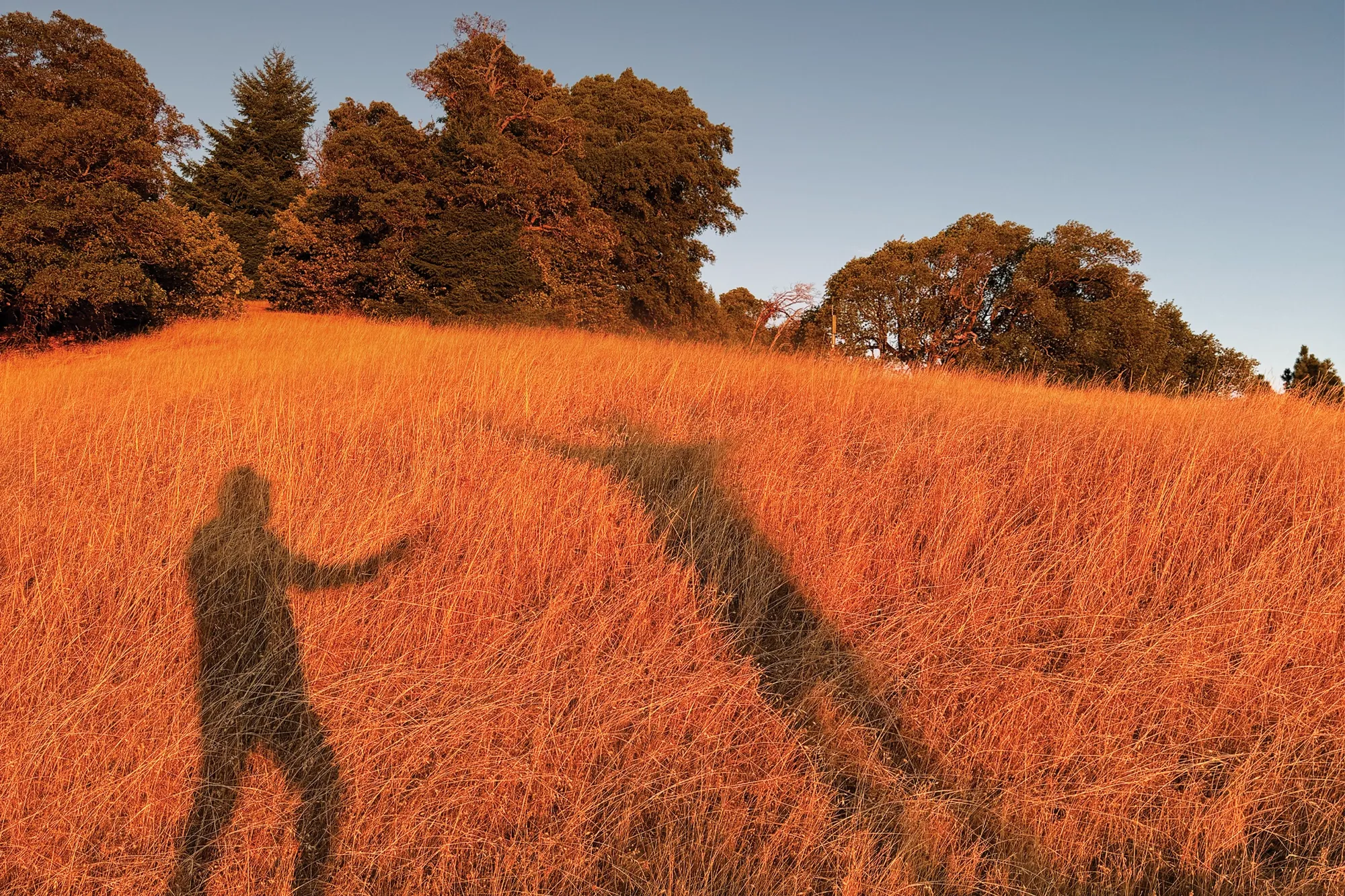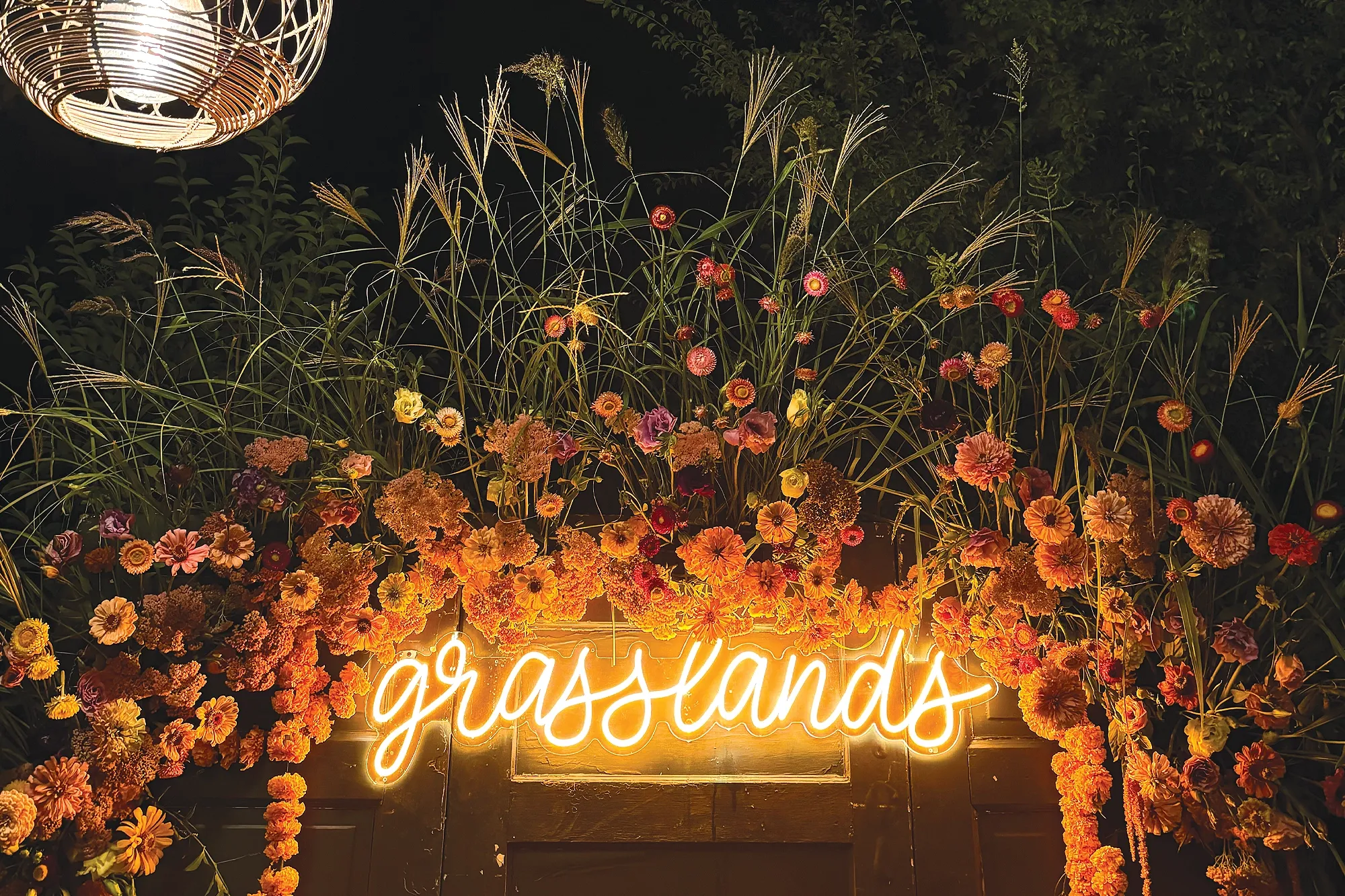
Taking the High Road
72 Hours in Mendocino County: The Lunar Harvest
Written By: ZACH SELWYN Photography By: HAINES WILKERSON
Ian Powell is the beloved owner of Yokayo Ranch, one of Mendocino’s most unique and beautiful boutique retreat destinations. Out here in the Ukiah, California wilderness, guests can overlook rolling hills of green and indulge themselves in a breathtaking tableau of natural beauty as they gaze out at the tranquil splendor of the valley. Yokayo Ranch will make your dreams a reality.
Oh, they also cultivate thousands of pounds of marijuana a year.
And I think I’ve smoked at least half that amount in the time I’ve been here. I arrived this morning.
I rolled into Mendocino County chasing two separate assignments for Hiii Media. Firstly, I was informed that I would be going to a cannabis farm in the Mendocino mountains where actor Woody Harrelson has a preferred strain—and watch a man sing to the plants to help them grow... or something. Then, I was being trusted to immerse myself with the folks who run Yokayo Ranch to find a story about how this “legacy cannabis” business has remained successful during today’s consistent challenges of market volatility.
It will all culminate Saturday night at Yokayo Ranch’s fifth annual Harvest Celebration—a weed industry party that revels in the second harvest of the year for Mendocino Grasslands—a cannabis brand owned by Powell that prides itself on their all-natural, sun-grown products. Apparently, last year’s bash was so magnificent that it ended with one guest barbecuing grilled cheese sandwiches out of glazed donuts at 4:20 in the morning.
The party is widely known to be the event of the late summer, with guests ranging from growers to buyers to packagers, distributors, designers, and breeders alike. There will be a bud bar, a couple of DJs, and a tattoo artist on-site. (I’m hoping they have a Phineas and Ferb option.) Every tent and room on the premises is at full capacity, and the evening promises to be biblical, so they’ve advised me to take it easy my first two nights on the ranch. With pounds of marijuana in plain sight everywhere I look, I know it won’t be easy.

Earlier that morning, I hopped on a quick $72 Avelo Airlines flight (Yes, the airline that charges you $15 to put down your tray table.) from Burbank to Santa Rosa and gobbled up a 10-gram edible to kill the nerves. An hour and a half later, I stood outside the baggage claim, talking to two life-size statues of Charlie Brown and Linus from the Peanuts cartoons. (Creator Charles Schulz was a Sonoma County resident, and the airport has honored him by decorating their halls like an immersive Peanuts convention).
We eventually made it up to Ukiah, where the GPS went offline and the dirt roads began. After a few wrong turns, we came across the entrance to Yokayo Ranch and found a sign suggesting that weary travelers pause and “take a deep breath.”
As I rolled down my car window to do as I was told, the crisp Mendocino air greeted me with a warm embrace, carrying an earthy and intoxicating scent. The aroma of the nearby marijuana fields fanned through the redwoods, a delicate blend of pine and syrupy resinous notes. It was as though the very essence of the forest had united with the heady fragrance of cannabis, creating a skunky symphony that embraced me and my Uber driver upon inhalation.
“Smells like it’s gonna be a fun weekend,” she remarked.
“If I survive, I’ll call you for the ride home.”
Walking out onto the ranch felt like something from a White Lotus episode mixed with Spawn Ranch, as depicted in Once Upon a Time in Hollywood. Everyone there was tanned, naturally in shape, shirtless, pierced, and heavily tattooed. I am none of those things, and when you walk onto someone’s property wearing sweatpants and a brand new oversized Zig-Zag t-shirt (a gift from Hiii), you begin thinking that you probably look like a narc. Then again, with everything in California decriminalized, I could have been a uniformed DEA agent, and it still wouldn’t have mattered.
I was quickly introduced to Adam and Rachel, long-time family members of the ranch. Rachel, Ian Powell’s sister and referred to as “Mom” by more than one employee, welcomed me with a maternal glow. She looked happy. Looking around the ranch, everybody here looked happy. There were no influencers making content. No zombies hunched over iPhones scrolling through TikTok. It was immediately not lost on me that there was a positive vibe out here.
“Do you drink beer or smoke at all?” Adam asked me.
“Yeah, man... of course.”
Adam, Mendocino Grasslands’ Brand Manager, handed me a cold Modelo and kindly showed me where all the marijuana was stashed for the party. It was how I imagined Howard Hughes’ final residence, where jars were stacked up side by side across the floorboards of the room. Thankfully, these jars were filled with weed and not urine.
“Grab whatever you want, man... I can give you a rundown of all the strains.”
I snagged a jar of a strain called Carbon Fiber and was taken to my room, which I would be sharing with Pam, the Co-founder of Hiii, and her friend Haines, whom I had yet to meet. The only description I had received about Haines thus far was that he was “one of the most celebrated iPhone photographers in the world.”
The room featured six beds in the same common area, reminding me of my days at summer camp. The biggest difference was that the scent of the weed growing in the lower canyon smelled a lot better than the scent of Joshy Goldfarb’s tennis shoes back at Camp Charles Pearlstein.
Adam briefly went over a few things about the bathrooms and where to find coffee and then sort of let it slip that the owner of the ranch, Ian, had done five years in federal prison for marijuana trafficking.
“I’m sorry, what?”
“Yeah, we all wear our badges, man... lotta stories up here. Anyway, here’s the schedule for the rest of the day.”
Adam handed me a slip of paper with the following on it:
4PM: Zach to arrive and decompress. 6PM: Zach to meet for dinner, weed, and beers by the campfire.
That was my kind of schedule. I learned from Adam that some folks may refer to this as “Mendo Time” and that I was now in the zone. He left me a joint of one of Mendocino Grasslands’ strains called Caribbean Cookies and told me to take an hour or so to get settled. I shook his hand and proceeded to get so wholly stoned that I forgot that I had turned the shower on and that it had been running for ten minutes.

Forty-five minutes later, flying higher than pterodactyl tits, I made my way into the general population. Adam introduced me to a guy who grew up in Hopland named Bobby, whose hippie dad answered an ad in the back of a 1970s Rolling Stone that said, “Own 40 acres in Northern California for $6,000.” During the Vietnam War, his dad took the bait, left Brooklyn, and bought actual land in the most fertile grounds in California... for 6K. Nowadays, six grand might get you a three-foot patch of grass behind the Harbor Freight Tool building off Ukiah’s Main Street.
Bobby’s story was similar to a few of the folks I had met. They were second and third-generation marijuana farmers. They had respect, good reputations, and, most likely, a bit of a criminal history. As “legacy growers,” they also seemed somewhat upset that cannabis had been decriminalized and that the corporations had infiltrated the industry so widely.
“You can’t make money in weed anymore,” Bobby told me. “Corporate cannabis came in and fucked everything up for guys like Ian. Back in the day, to make money, you had to have balls."
This sentiment permeates throughout the Mendocino Valley. These “legacy” cannabis growers, who came up in the weed game, had to do it all illegally. They were the OGs. Nowadays, corporations and outside investors have made recreational cannabis so readily available that the little guy is getting squeezed out. So, folks like Ian Powell are sort of like N.W.A. paving the way for gangsta rap. These guys took the hits so that weed could eventually become normalized for anybody who wanted to start selling and growing.
After sitting down with Ian, I realized he is this county’s Ice Cube. He has the respect of everybody in the industry, and being welcomed into his world is like being allowed inside the VIP section at the cannabis Super Bowl. We were standing in front of a freshly built photo backdrop where he had just finished hanging up a farm tool from the 19th century that looked like it would be the perfect weapon to build a horror film franchise around. Before I could pitch him my Zombie-Weed movie idea called Cannazombies, he rolled me up a fat joint of his creation called Mule Fuel.

He broke down how he ended up owning 155 acres of land and the most scintillating wedding venue in Mendocino County.
A self-described veteran of both the Marine Corps and the federal prison system, Powell is a maverick of information—a spiritual cannabis weathervane with a vast knowledge of farming, cultivation, and all things marijuana. As a kid, he grew up hiding plants from hovering police helicopters, using ridgelines and hollowed-out redwoods as stealth growth areas. (I grew up going to Kindergym.) He bought the ranch back in 2018 after turning the then-owner’s small 150-pound-a-year weed hobby into a thousands-of-pounds-a-year business in a little over 12 months. He saw Yokayo as a chance to do something right for the community. It was a way to grow the plants he believes in medicinally and recreationally and to bring in income with wedding parties, yoga retreats, and corporate events. He first found the place when his sister got married here in 2015, and Ian wasted no time getting to work. Hearing Ian tell stories about his monthly activities—rebuilding a barn, drying out thousands of pounds of product, installing a 300-foot drum to satisfy permit laws, running a backhoe to irrigate rainwater, re-plumbing a new bathroom in the fields for the workers, and so on, I began to realize that I was the laziest man on the planet. I’ve had a broken hinge on my pantry door for the past nine months.
Pam and Haines finally called. They had been distracted by a wine tasting in Healdsburg. I lit another joint and joined Ian, Adam, and Bobby for a quad-runner sunset tour of the Gardens.
Touring acres of plants with Ian Powell is not unlike taking the Universal Studios Tram Tour. However, instead of seeing the Psycho movie house, you see a drying house with thousands of pounds of harvested flower ready for the next step. You’ve heard of the Waterworld Stunt Spectacular? This tour is the SKUNK Spectacular. Instead of talking about some true crime film shot on the Universal lot, Ian will openly share his own arrest story, which was about as cinematic and as real as it gets. (Ian is a genius storyteller but casually marks his five years served as “just a part of the business.”)
As the perfect marijuana field tour guide, he offered up tidbits about how Mendocino Grasslands uses no harmful pesticides, how they honor heritage seeds, always credit the source when cross-pollinating, and how he built a million-gallon rainwater pond that uses solar paneling to distribute water uphill, only to be gravity-fed back down towards the gardens. Ian’s engineering knowledge is nothing short of remarkable. If he wasn’t in the cannabis business, I’m guessing he could have brought those astronauts that were stranded in the space station home in a little under a month.
Smoking some of the product in the valley put me in a peaceful posture that made me feel, to borrow a term from one of my 1990s hip-hop heroes, Keith Murray...lifted.

Adam explained how the folks at Mendocino Grasslands do things differently than corporate cannabis companies, which grow mainly for profit and not necessarily for the people.
“Well, we use living soil, which means we don’t dump it and cultivate new soil every year,” he began. “We don’t use any salt-based nutrients, which can affect the way it’s metabolized by somebody once it’s smoked, but ultimately, this valley just has a different terroir from other areas.”
A “terroir” is the natural environment in which the plants are produced, which includes factors like soil, climate, and topography. At Mendocino Grasslands, for instance, a reliable afternoon breeze helps with distribution and airflow and can naturally mitigate things like fungus that can form on the plants, like powdery mildew.
“What’s fascinating is that if you were to move these plants even 100 yards away, they would grow and react differently,” Ian stated.
Whatever terroir we were currently in was working just fine for me. I made some half-hearted jokes about how “Welcome to the Terroir-dome” was my favorite Public Enemy song and got a small laugh from a farmer. I didn’t mind. The flower at Mendocino Grasslands made me feel like I was on top of the world.
Talking to these farmers down in the valley was incredible. They discussed managing the pH balance and calcium distribution in their strains. When they began discussing potassium levels, I was amazed at the science that went into this growth level. It’s a far cry from the two plants I grew in my dorm room closet in the 90s.
“We go from farmers to chemists real quick,” Ian explained.
After returning to the ranch around 8:30, Adam and I were around the fire pit when I asked him if we would have dinner.
“Oh, that’s right, we should probably eat,” he said.
If there’s any way to describe “Mendo Time,” it is that. Eat when you want, not when you’re supposed to. Smoke as much as you like. Show up when you’re asked. Otherwise, live in the moment, be kind and grateful.
After some excellent Michoacán Tacos, Pam and Haines arrived. I did my best to roll a joint of the Curacao flower that Adam had just handed me, but my joint was far from exemplary—instead, boasting a skinny bottom, a fat middle, and a skinny top.
“We call that a ‘Dad Bod Joint,’” Adam said.
Or maybe I said that. I wasn’t sure at that point. All I knew was that the following day, we were scheduled to visit the hidden farm nearby where one of Woody’s favorite strains grows and watch some guy sing to the plants. As I drew off my J, I looked up at the stars and smiled, as happy as I had been in a long time. I was praying that Pam or Haines didn’t snore.

We were winding through the breathtaking back mountain roads of the Willits, California mountains, looking for Woody’s botanist. The farm is called Emerald Spirit Botanicals, and their five-time Emerald Cup-winning strain, Pink Boost Goddess, is one of the most revered and respected cannabis strains in Mendocino County and worldwide. It is grown on a family farm by a beautiful Earth mama named Katie Jean and her spry and multi-talented sons Joseph and River.
When we finally located the property, hidden just beyond the ridgeline, a bloody animal bone greeted us on the grounds just outside of Joseph’s son’s homemade sandbox. We asked Joseph what it was.
“Sorry, my brother just butchered a deer.”
Joseph and his family live off the land. They farm, hunt, and drink natural spring water from the base of a redwood tree. Their garden is a flourishing spread of vegetables and marijuana. Fresh yellow watermelon, homemade yerba mate, and tomatoes greeted us upon arrival. So did a man named Totter Todd, who had fastened two simple electrodes to a marijuana plant and was listening to the plant make actual music.
“So the plant makes music?” I asked. “I thought you were gonna be singing them some John Denver songs or something...”
More of that in a second.
Joseph and River were raised in a teepee by their mother, Katie Jean. Katie Jean’s kind face and glowing eyes signal a chemical-free diet. When she brought us watermelon from her garden, I jokingly asked, “That’s Trader Joe’s, right?”
She laughed. This family hasn’t eaten anything that wasn’t farm-to-table in decades. They were also cultivating some incredible cannabis plants, which I was hoping would go farm to lung.
A faint sonic soundscape began traveling through the garden. Totter was in the zone, operating a multi-faceted device that looked like it came straight out of an airplane cockpit. Cables were spewing into hundreds of inputs; a laptop had been attached to a strange “plant singing device” that Katie Jean had personally made for her in Italy... and it was somehow making music. Joseph explained that the device picks up the electrical signal generated by fluids in the plants. Then, the device converts the fluid into sound waves that allow one to communicate with plants. So, instead of this guy singing to the plants, the plants were singing to us.
“It’s like a human being picking up a musical instrument for the first time,” Joseph explained. “They can make noise but don’t know how to play it. We feel the same way with the plants. They become accustomed to the device, and they get better at communicating throughout the process.”
I understood what he was saying and hadn’t even smoked anything. After hearing about how impossible it was to keep a cat as a pet in the mountains due to the natural predators around the property, I was ready for some Pink Boost Goddess.
Joseph broke down the cannabinoids in their award-winning strain. In this sun-grown world, as with Mendocino Grasslands, it is way more about the terpenes and less about the THC. It is a radical shift in cannabis production and a welcome one at that. With so many corporate growers jacking up THC levels, consumers are experiencing more extreme highs. Katie Jean and Joseph are looking for cannabis to provide medicine that will heal us. Their latest studies involve CBG and THCV—which are mood elevators that have been shown to help people with ADHD, anxiety, and diabetes.
“It also controls appetite and food cravings,” Joseph offered.
“So it’s like ‘Ozempic Weed?'” I commented. The methods that legacy growers are experimenting with also keep you even-keeled. It’s been a nice change from the last Moonrock pre-roll I bought in an LA dispensary, where I spent 30 minutes drooling on my dog after promising to take him for a walk. It’s also a far cry from the dirt weed of my youth, which was brought up in bricks from Mexico. Back then, we called it “pretendica.”
We drank some spring water and yerba mate and thanked the Emerald Spirit family for their generous time. We puffed a little of the Pink Boost Goddess, which was majestic, especially underneath the canopy of trees and the perfect blue sky. Joseph told us a story about his first time smoking pot at 15 out of a hollowed-out Jenga block. He also showed me how to properly tuck a joint on the underside of a freestyle frisbee and toss it without losing the light. Before we drove back to Yokayo Ranch, River offered to feed us.
“If you want fresh deer meat, you can stay for lunch,” he said.
“I’m good, bruh.”

There is an old saying in the rock n’ roll world that goes unspoken: “Never be the drunk guy at a Pink Floyd show.”
At the party, I aimed to follow that mantra to a T or to a J. Whichever was handed to me first.
The Harvest Celebration Party officially started at five, but guests had been hanging around and smoking at the ranch since three. Ian and his team were putting the final touches on the decor and setting up weed stations and rolling areas. I was hanging with Adam as he prepared the bud bar, asking him more about what they will offer guests tonight.
“We pride ourselves in appealing to everybody’s palate,” he explained as he put a jar beneath my nose. “Smell this—it’s got a lot of gas in it, right?”
Adam’s weed lingo was new to me. Terms like “gas,” “citrusy,” and “terpy” (a way to describe the terpene and ocimene in the plant DNA) are new descriptors in my weed vocabulary. The lingo is so complex and detailed, with so many strains, that I felt like I was in a coding class at one point. My favorite was when Adam handed me a fluffy nugget and described the aroma as smelling like “smashed ants.”
Adam also explained how Mendocino Grasslands takes old heritage seeds and cross-pollinates them with modern genetic strains. The first-generation plants like Afghani Kush and Hindu Kush were known as the landrace strains. The second generation began crossing seeds and hybrids, leading to exotic strains with a deep lineage and genealogy—there is so much cross-pollinating going on that I almost need to do a 23andMe on this.
I was literally in the weeds.
As the party started and the joints were rolled, every person in the tiny Mendocino marijuana community stopped by. Folks handed Pam, Haines, and me jars of cannabis, merch, stickers, and joints. At one point, I lost track of what I was smoking. There were so many ways to ingest marijuana, from dab rigs, gravity bongs, and bubblers to joints and flower, that everything looked hyper-futuristic. At one point, I took a sip from my water bottle and a dude ran over, intrigued.
“Holy shit—what kinda crazy shit are you smoking, man?” he asked.
“Uhh, it’s a water bottle, bro,” I responded. Out here, people think in paraphernalia.
I finally ran into Ian by the tattoo station, where he was contemplating inking a pear on his arm to honor his mother. He was looking at some of Haines’ iPhone photos of the weekend and complimenting him on them. (Haines lived up to his iPhone-photo-God reputation, right?)

As Ian surveyed the hundreds of people enjoying his weed and property, you could see the joy behind his eyes. He had been to the bottom, but at that moment, he seemed pretty proud of how he turned his fortunes around at Yokayo Ranch. This place has a special energy permeating through it, representing a huge win for the small grower.
About twenty minutes later, a hippie-looking guy with eyes like a roulette wheel asked me to come to his tent for a sample of his weed. I thought about the advice my wife once taught me that I have followed my entire life:
“Never follow a hippie to a second location.”
I told him I was cool and proceeded to eat four tacos from the food truck. At Yokayo Ranch, the money is going into the right place. For 72 hours, I had failed to think about my electric bill or the fact that the Yankees aren’t hitting. I had smoked more perfectly balanced marijuana than I ever had in my life. There was no hangover, no cloudiness, just sheer creativity and an abundance of energy. It was truly medicinal and had even kept me away from trying to forage for alcohol in some back house fridge like I often do at home.
This was the kind of magical, bohemian place that could officially normalize the weed experience for the entire world. And by the way? Practically nobody was staring at their phones. Human communication is alive and well in Mendocino. (It probably helped that most of these marijuana brands were shadow-banned on Instagram.)
My one issue at the party was that I had failed to talk to anybody about anything other than marijuana. It was like being at an industry party in Hollywood, discussing whether or not streaming services had broken the movie-going experience forever. In this case, it was all about big bad corporate cannabis and how hard it is to make any money growing weed these days.
At long last, I spoke with a younger kid about something other than marijuana. He was there capturing content for the ranch but was discussing how he was an officially sponsored professional fingerboarder. (Yes, when you skateboard on a mini skateboard model with your fingers.) I was so excited to talk about something other than weed that fingerboarding suddenly became my new obsession.
“I’m a way better handboarder—until COVID killed it,” he explained while pulling off a perfect frontside 180 kickflip.
“Hand boarding? What is that?” I asked, fascinated.
“It’s my favorite... I thought I was done, but China just approached me for a graphic.”
God, I am old.
As the party wound down, I made my way back to my room, wishing I didn’t have to leave. The Emerald Triangle of Trinity, Humboldt, and Mendocino Counties had drawn me in, and I felt like this was the type of place I could find myself living when I was older. I texted Ian and thanked him for the incredible experience. I did my best to lie in bed as the DJ continued to pump out EDM from just outside my window. Accepting that the music would not stop, I decided to make my way back down for a final lap and maybe find something to eat.
Amazingly, I hit the barbecue just as a guy was finishing up a late-night snack for the remaining party guests.
I had no idea that a grilled cheese glazed donut could taste so good.




